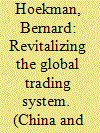| Srl | Item |
| 1 |
ID:
108704


|
|
|
|
|
| Publication |
2011.
|
| Summary/Abstract |
Agricultural liberalization is one of the most contentious trade issues in Japan and Korea. Yet, important differences characterize the Japanese and Korean governments' positions on agricultural liberalization when negotiating on free trade agreements (FTA). The Korean government supports substantial agricultural liberalization, whereas the Japanese government is reluctant to abandon farm interests even at the risk of undermining its FTAs. Given strong similarities in their agricultural structure and politics, how do you explain divergent government positions between Japan and Korea? The structure of a country's domestic trade governance largely explains the Japanese and Korean governments' varying approach to agricultural liberalization during FTA negotiations. Domestic trade governance refers to the decision-making structure and process on foreign economic policies. Cohesive domestic trade governance enabled the Korean government to pursue agricultural liberalization under the broader national agenda of promoting trade through FTAs. In contrast, fragmented domestic trade governance gave disproportionately larger weight to agricultural interests within the Japanese government, ultimately allowing agriculture to undermine the success of Japan's FTAs.
|
|
|
|
|
|
|
|
|
|
|
|
|
|
|
|
| 2 |
ID:
142210


|
|
|
|
|
| Summary/Abstract |
Interest groups partake in transnational negotiation conferences en masse. This is surprising given that the chances for influencing policymaking at these venues appear to be slim while the costs of participation are high. This amounts to an interesting question: why do so many interest groups attend transnational conferences? This article aims to answer this question by offering the first systematic study of the activities of interest groups at transnational conferences. It analyzes the goals, strategies, interactions, and influence of various types of interest groups at two transnational conferences; namely, the World Trade Organization Ministerial Conference (2011) and the Conference of the Parties of the UN Framework Convention on Climate Change (2012). The data was collected through 349 interviews with interest group representatives and 129 interviews with government delegates who participated in these conferences.
|
|
|
|
|
|
|
|
|
|
|
|
|
|
|
|
| 3 |
ID:
146696


|
|
|
|
|
| Summary/Abstract |
Since 2008, G20 leaders have repeatedly committed themselves not to resort to protectionism and to conclude WTO negotiations expeditiously. The jury is out on the extent to which they have lived up to the first promise; they have failed to deliver the second. Anemic global trade growth rates since 2010 imply that trade has not been a driver of much-needed economic dynamism. This paper argues that the G20 should pursue a more ambitious trade agenda and that there is much that greater leadership by the G20 could do to reinvigorate the trading system. A first step would be to commit to concrete actions that can be implemented by individual governments on a concerted basis and that center on reducing trade costs and improving access to services for firms. The Chinese presidency should also seek to have the G20 commit to more effective monitoring and analysis of trade policy broadly defined (including subsidies and investment incentives) and the impact of the many preferential trade agreements involving China, the EU and the USA, the world's largest trading powers.
|
|
|
|
|
|
|
|
|
|
|
|
|
|
|
|